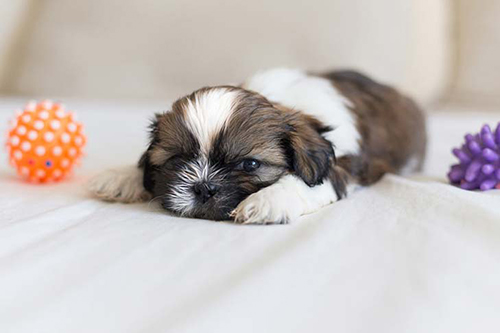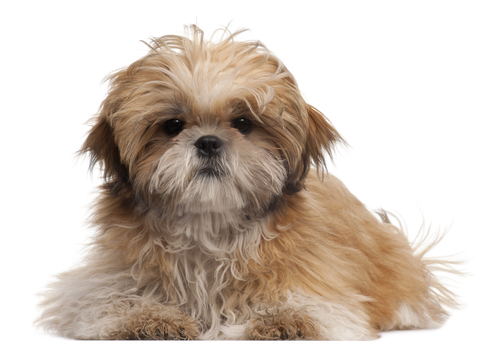As we know them today, Shih Tzu dogs or (chrysanthemum dogs) resemble miniature lions as their ancient breeders intended. Hence the nickname “lion dog.” Here is some Shih Tzu breed information for future owners.
Looking at these beautiful, loyal companions today. We can only appreciate the imagination and the dedicated efforts of the earliest breeders. It is a known fact that Shih Tzu breeders selected traits that influenced some fundamental human emotions, such as the “cute response.”
When we first see a Shih Tzu, the first thing that comes to mind is “cute.” This is a natural response that we can all relate to. Therefore, this dog is one of the most popular dogs in the world today.
There is no denying that the Shih Tzu, especially the puppies, are just too cute to ignore. However, no matter how cute they are, this breed is not for everyone. Shih Tzu ownership is a serious commitment.
Shih Tzu Breed Information: Commitment and Learning
There is a lot to learn about this breed if you want to give them a loving home, where they can prosper and love you. Shih Tzus need a lot of care and attention.
The Shih Tzu must live indoors, and they demand regular grooming. This is a breed that also lives for a long time. Therefore, you must prepare for a long-term commitment.
You must spend as much time with this dog as possible and learn everything there is to know about them. This breed also comes with a stiff financial obligation and commitment.

“The correct pronunciation for Shih Tzu is (sheed zoo), which is Chinese for lion.” However, according to historians, don’t let the Chinese name fool you. Experts believe that they developed the ancestors of the Shih Tzu in Tibetan monasteries before they made their way to imperial China.”
“The Shih Tzu is not the only breed created to resemble small lions. Other Asiatic breeds such as the Lhasa Apso, Pug, and Japanese Chin can also claim that tag.”
Shih Tzu Breed Information: Characteristics
The Shih Tzu is a companion dog. Therefore, their character and personality are essential. The temperament of a Shih Tzu is so important that it is a major consideration in the breed according to the AKC standard.
Your new Shih Tzu companion needs to be trusting, friendly, happy, confident, outgoing, and affectionate. Personality flaws such as nervousness, shyness, or aggressiveness are not optimal.
This is a breed that is alert, bright, and lively. Your little companion dog needs to carry herself in an arrogant, aristocratic, and proud manner, all with her head held high with her tail curved over her back.
Shih Tzu Breed Information: Personality
In the mind of the Shih Tzu, you will find a cornucopia of different emotions, innate ingrained behaviors, learned and reinforced behaviors, genetics, perceptions, and memories.
Various factors influence the aforementioned list, such as raising, socializing, and training it. Also, the dog’s environment and experiences play a big part in how they behave and think.
Keep in mind that the first twelve weeks in a Shih Tzu’s life are important. They are most impressionable in personality development; this is especially true between 3 and 9 weeks of age.
The Shih Tzu is a breed so highly domesticated that some of its behaviors have been instinctive for many centuries. However, there is a good deal of the dog’s personality influenced by human, experiences, and environment other than their ancient ancestors.
List of Normal Personality qualities:
Playful, outgoing, inquisitive, affectionate, sweet, arrogant, sometimes bossy, easily pampered, show off, like to investigate new sights and sounds, approaches in greeting, loves to be with the family, loves people lifting, carrying, cuddling, and pampering them
List of Personality flaws:
Fearful, shy, reclusive, run when approached, growls without provocation, aggressive, nips with intent to harm, fear-biter, incompatible with littermates, struggles to escape when picked up, yelps or protests when held, does not enjoy human company, does not want to be a pet, is not eager to please
Shih Tzu Health
You will always be able to tell when your Shih Tzu is feeling healthy. Mostly, she’ll be bright-eyed, alert, beautiful, active, and inquisitive.
Therefore, if your Shih Tzu looks depressed, does not want to eat, lethargic, losing weight, or any other problems that may not seem normal, please contact your vet as soon as possible for more Shih Tzu breed information.
Here are some Shih Tzu disorders that you should know:
Brachycephalic conditions – An elongated soft palate, small or pinched nostrils, and breathing difficulties.
Dental abnormalities – Abnormal placement of teeth: misalignment, malocclusion, an abnormal number of teeth: missing teeth, kept deciduous (baby) teeth; dentigerous (teeth bearing) cysts that cause bone jaw lesions.
Ear conditions – Congenital deafness; infections (the dropped ear covers the ear canal, making a warm, moist environment for bacteria and yeast to grow), characterized by a foul odor, waxy buildup, pain, and itching.
Skin problems – Allergies: food, parasites (especially fleas); immune-related skin problems.
Bleeding disorders – Slow blood clotting time (Von Willebrand’s disease).
Skeletal problems – Open fontanelle: Failure of the “soft spot” on the skull to close by adulthood; Patellar luxation: the kneecap slips in and out of proper position because of a flaw in bone (femur) structure and weak ligaments (is surgically corrected).

